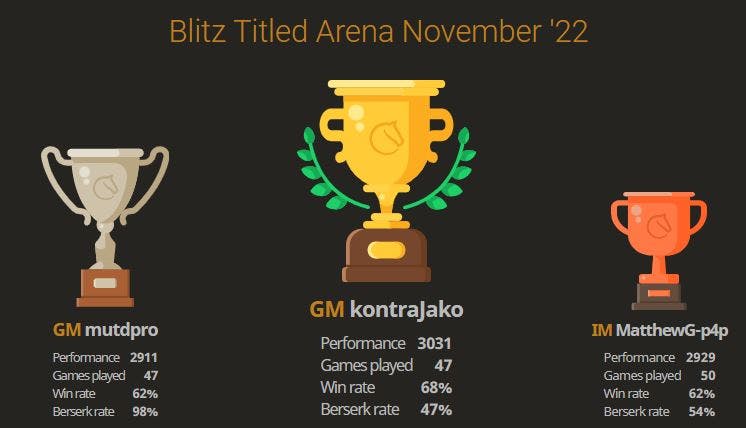KontraJako narrowly wins TA Arena ahead of mutdpro, MatthewG-p4p
And why Sergei Zhigalko's epic near-comeback might have been the story of the tournament

The anonymous Grandmaster "Kontrajako" edged out mutdpro (GM Minh Le Tuan) in last Saturday's Titled Arena with MatthewG-p4p (IM Matvey Galchenko) coming in third (an auspicious result for the young Russian International Master). The top two places were decided in the final minute when kontraJako prevailed against MahammadMuradli2003 whilst mutdpro lost to fourth-place finisher Zhigalko_Sergei.
To 'zerk or not to 'zerk
One interesting aspect of the Lichess Titled Arena is the "berserk" feature and the different approaches participants take to it - some "zerk" rarely (or only against much lower-rated opponents), some "zerk" situationally, and a handful, such as mutdpro, seem to berserk practically every game as a matter of principle. The hows and whys of when to berserk can play a major role in who ultimately wins these events and is worth a closer look. For instance, let's examine the games of our fourth place finisher, Sergei Zhigalko. Why Sergei? Well, mainly because GM Zhigalko streams practically all of his online games on Youtube but also because Sergei's epic (and highly entertaining) tilt and recovery midway through this tournament had a major effect upon the ultimate standings.
Anatomy of a Tilt
Perhaps the most important ingredient in a good disaster story is a promising beginning, such as Zhigalko's first dozen games in this tournament in which he went undefeated, emerging as the tournament leader. Among those games was a critical win against mutdpro:
https://lichess.org/study/BtCgti67/5l3yR0Ry#45
However, in round 13, our hero finally meets his nemesis in the form of the mysterious kontraJako who, as we shall see later, specializes in spirited defense:
https://lichess.org/study/BtCgti67/R8Hy4jf5#34
Perhaps disheartened by losing this pawn-up endgame, Sergei then drops a game to (the well named) drop_stone but quickly rights the ship with two berserking victories in a row only to encounter kontraJako for a second time. Sergei sensibly refrains from berserking this game and what results is quite possibly the game of the tournament:
https://lichess.org/study/BtCgti67/qgbVAEmY#22
After this second loss, our intrepid Zhigalko, recognizing the need for drastic measures to erase kontraJako's increasingly large tournament lead, begins a topsy-turvey run of berserking wins and losses to more or less keep pace. However, after a loss against PaulfromSPb, Sergei runs into the "Jako" one last time:
https://lichess.org/study/BtCgti67/h6EgAjFE#81
This third and arguably worst loss against the tournament leader (and eventual winner) officially begins poor Sergei's descent into Tilt-Town, population him. Five more losses, all whilst berserking, follow, leading to a dramatic pause in his YouTube stream.
One might wonder why Zhigalko continued to berserk throughout all of these defeats. The answer isn't simple, but perhaps partly has to do with delicate nature of how berserking functions in top lichess events. In some ways, berserking is a sort of chess version of the "Prisoners Dilemna".
| Prisoner's Dilemma | Prisoner A snitches | Prisoner A remains silent |
|---|---|---|
| Prisoner B snitches | two years jail for both | three years jail for A |
| Prisoner B remains silent | three years yail for B | one year jail for both |
| Berserker's Dilemma | White doesn't berserk | White berserks |
|---|---|---|
| Black doesn't berserk | No advantage | Advantage for Black |
| Black berserks | Advantage for White | Minor advantage for both |
Of course a big difference between the two is that the second player to berserk is aware of the first player's irrevocable choice. This would trivialize "Prisoner's Dilemma", as presumably few prisoners, knowing that the other has already chosen to remain silent, would also choose to remain silent when they can "win" by snitching. Interestingly, this doesn't hold for Berserker's Dilemma for two main reasons. First, and probably foremost, berserking isn't necessarily a bad thing as it offers several advantages regardless of what your opponent chooses to do: it increases the reward for winning, it shortens the game (a major factor in online arena events), and the disadvantage of having less time than your opponent is mitigated by the fact you can think on your opponent's time and, moreover, your opponent cannot think on your (nonexistent) time. Second, the decision to berserk exists not in the vacuum of a single game but throughout the entirety of the tournament. What this means in practical terms is that your opponent may decide that they stand to gain more by "encouraging" you to berserk in the future by berserking back since, after all, once you've berserked, all outcomes are now more positive from their perspective than if you hadn't. Thus, it could be that Grandmaster Zhigalko had, during his seven game skid, hoped for more "cooperation" from his opponents, but alas, instead fell victim to his own prowess at bullet chess, for none save the fearless mutdpro was willing to accept Sergei's invitations to dance.
In any event, our saga does not end here, for Zhigalko, being the indefatigable fighter he is, now picks himself up, stops beserking, and embarks on an incredible run of 9(!) consecutive wins, culminating in dashing mutdpro's last-minute hopes of snatching the tournament away from kontraJako:
https://lichess.org/study/BtCgti67/uO2TcPtF
To sum up - the tournament winner not only went 3-0 vs Zhigalko, but also tilted him to the point where Sergei eventually, like some sort of incredible chess hulk, began demolishing all of kontraJako's rivals throughout the crucial last half-hour of the event. Well played, Jako. Well played.